Your Company Name And Logo

Climate Change Knowledge
Climate change
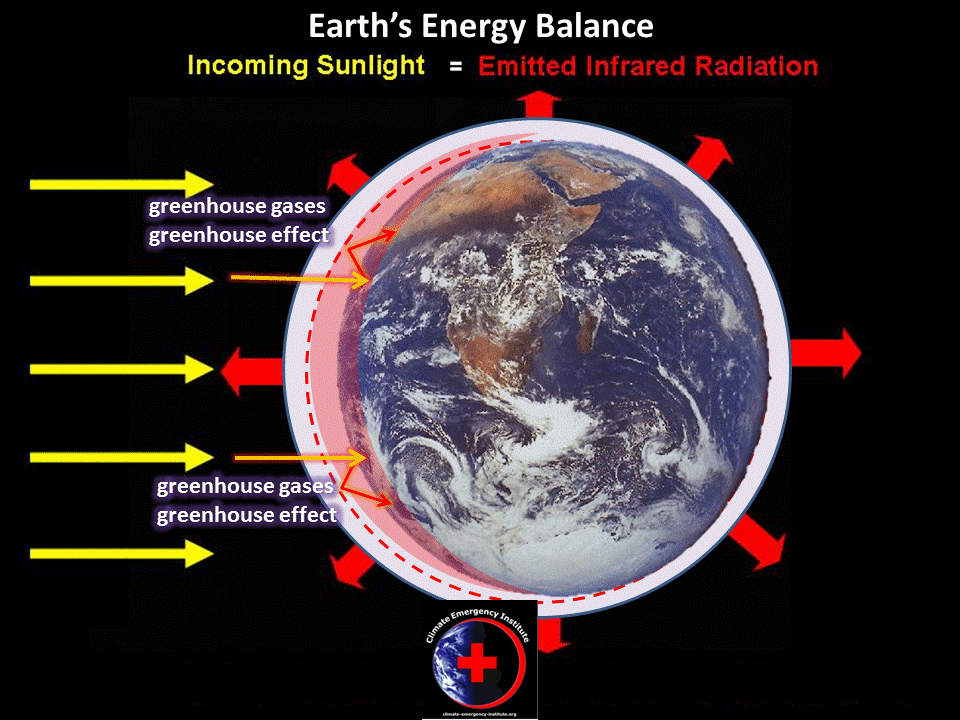
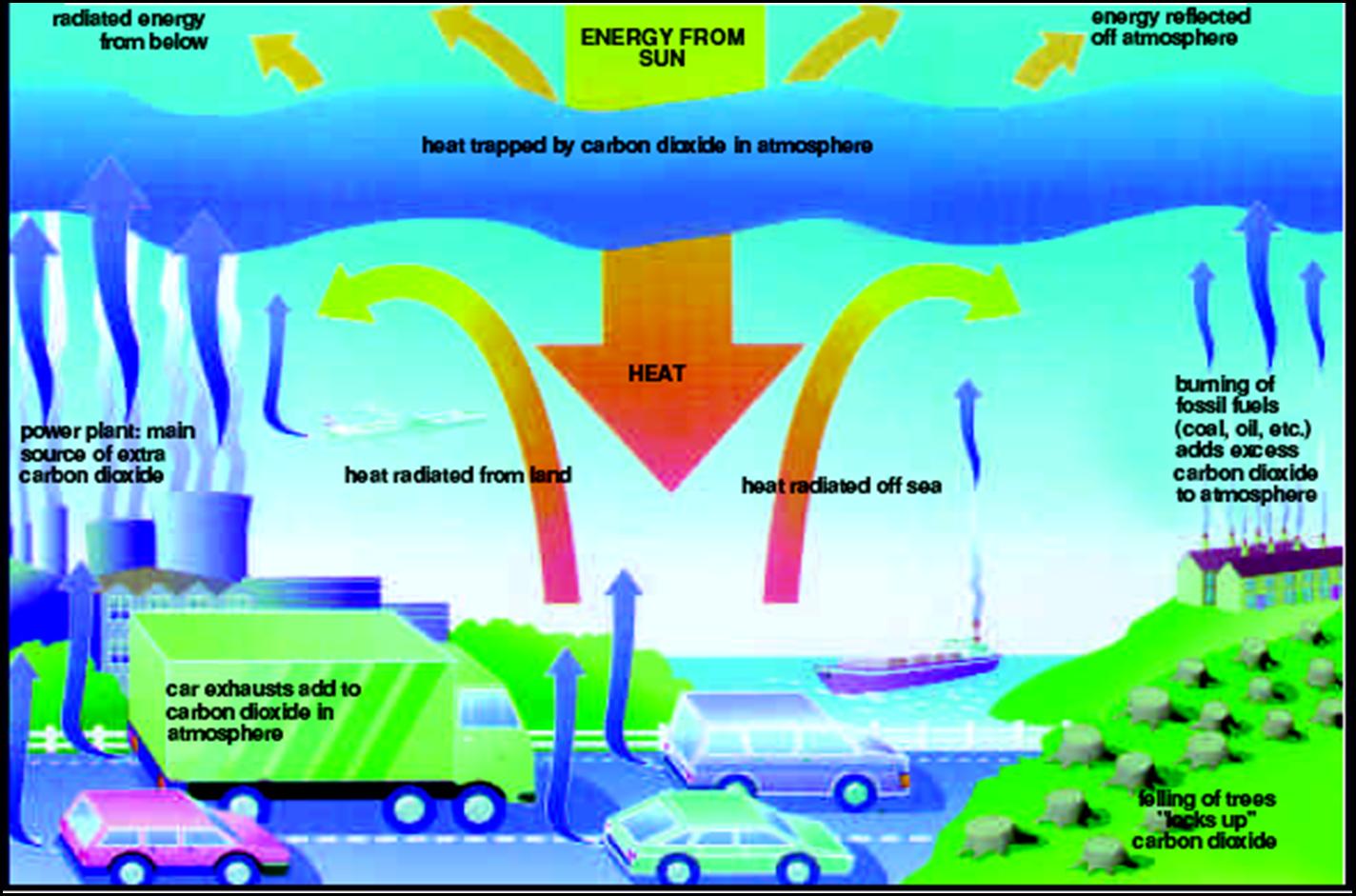

Definition IPCC
Climate change refers to a statistically significant variation in either the mean state of the climate or in its variability, persisting for an extended period (typically decades or longer). Climate change may be due to natural internal processes or external forcings, or to persistent anthropogenic changes in the composition of the atmosphere or in land use.
Top short video EPA Climate Change Basics
Climate change refers to a statistically significant variation in either the mean state of the climate or in its variability, persisting for an extended period (typically decades or longer). Climate change may be due to natural internal processes or external forcings, or to persistent anthropogenic changes in the composition of the atmosphere or in land use.
Top short video EPA Climate Change Basics
As John Holdren points out climate disruption is a more accurate description.
Some say climate change and variation.
Atmospheric greenhouse gas pollution causes global warming.
Global warming causes global climate change.
Global climate change changes the weather (climate is just weather over a long period).
The most important aspect of the climate system for us is its great intertia and momentum (mainly because of the vast ocean), likened to a huge super tanker.
The hallmarks of climate change are unpredictability and extreme weather.
Global warming also involves more energy being added to the climate system so the Earth is now out of energy balance. More energy is being added by energised GHGs than leaves the Earth to space.
This energizes the hydrological water cycle. There is more water vapor (warm air holds more water vapour) which is driven by more energy.
Climate change involves more
This increases the tendency to heat and drought even more and also of extreme cold and snow.
Abrupt climate change Under the extra climate forcing climate has an increasing tendency to change abruptly- especially as more GHGs are added tom the system by planetary feedbacks - particularly the powerful GHG methane.
'Runaway' climate change
This is what the scientists call abrupt irreversible climate change or rapid warming.
It is due to the multiple large Arctic +ve feed-backs acting in combination. (This is not the runaway greenhouse effect).
Climate change in human terms is irreversible.
The ocean is a big part of the climate system.
Oceans have taken up 95% of the heat added to the climate system by more GHGs. Over a third of all added CO2 has been absorbed by sea water acidifying the oceans. The heating and acidification of the oceans will affect our climate. The vast capacity of the ocean to store heat and CO2 is one reason that makes climate irreversible.
It is largely because of the vast World Ocean that the climate system is characterized by great inertia and momentum.
Feed-backs
Global warming picks up more momentum as temperature and time increase because more +ve fed-backs come into action. The +ve feed-backs are potentially enormous many times greater than the emissions that cause them. The inertia momentum and feed-backs makes expecting computer model projections to tel us the danger limits a suicidal risky exercise.
Tipping points
The climate system driven by global warming has tipping points. A change reaches a certain point and then abruptly undergoes a massive change or collapses to a new degraded state.
This is a feature of natural systems, that have an inherent resilience or elasticiy up to certain point- at which they crash or snap.
Runaway greenhouse effect
This is a scientific term for what happened to Venus. It a static climate of extreme and cannot support any life. Venus in may ways is a twin to Earth. Its runaway greenhouse effect was due to CO2. James Hansen says if we burn all the fossil fuels for energy a dead Earth runaway greenhouse Venus syndrome is a dead certainty because that would cause all the sea floor methane hydrates to release their vast frozen store of methane gas. Today the only energy economic or climate plan there is- is to burn all the fossil fuels.
It is an atmosphere and climate of total death. The Venus runaway greenhouse effect is caused by most of a planet's water vapour (a greenhouse gas) concentrating in its atmosphere.
Some say climate change and variation.
Atmospheric greenhouse gas pollution causes global warming.
Global warming causes global climate change.
Global climate change changes the weather (climate is just weather over a long period).
The most important aspect of the climate system for us is its great intertia and momentum (mainly because of the vast ocean), likened to a huge super tanker.
The hallmarks of climate change are unpredictability and extreme weather.
Global warming also involves more energy being added to the climate system so the Earth is now out of energy balance. More energy is being added by energised GHGs than leaves the Earth to space.
This energizes the hydrological water cycle. There is more water vapor (warm air holds more water vapour) which is driven by more energy.
Climate change involves more
- climate variation
- unseasonal weather
- hotter nights especially ( the earth does not cool off as well)
- heat waves
- drought
- heavy rains
- floods
This increases the tendency to heat and drought even more and also of extreme cold and snow.
Abrupt climate change Under the extra climate forcing climate has an increasing tendency to change abruptly- especially as more GHGs are added tom the system by planetary feedbacks - particularly the powerful GHG methane.
'Runaway' climate change
This is what the scientists call abrupt irreversible climate change or rapid warming.
It is due to the multiple large Arctic +ve feed-backs acting in combination. (This is not the runaway greenhouse effect).
Climate change in human terms is irreversible.
The ocean is a big part of the climate system.
Oceans have taken up 95% of the heat added to the climate system by more GHGs. Over a third of all added CO2 has been absorbed by sea water acidifying the oceans. The heating and acidification of the oceans will affect our climate. The vast capacity of the ocean to store heat and CO2 is one reason that makes climate irreversible.
It is largely because of the vast World Ocean that the climate system is characterized by great inertia and momentum.
Feed-backs
Global warming picks up more momentum as temperature and time increase because more +ve fed-backs come into action. The +ve feed-backs are potentially enormous many times greater than the emissions that cause them. The inertia momentum and feed-backs makes expecting computer model projections to tel us the danger limits a suicidal risky exercise.
Tipping points
The climate system driven by global warming has tipping points. A change reaches a certain point and then abruptly undergoes a massive change or collapses to a new degraded state.
This is a feature of natural systems, that have an inherent resilience or elasticiy up to certain point- at which they crash or snap.
Runaway greenhouse effect
This is a scientific term for what happened to Venus. It a static climate of extreme and cannot support any life. Venus in may ways is a twin to Earth. Its runaway greenhouse effect was due to CO2. James Hansen says if we burn all the fossil fuels for energy a dead Earth runaway greenhouse Venus syndrome is a dead certainty because that would cause all the sea floor methane hydrates to release their vast frozen store of methane gas. Today the only energy economic or climate plan there is- is to burn all the fossil fuels.
It is an atmosphere and climate of total death. The Venus runaway greenhouse effect is caused by most of a planet's water vapour (a greenhouse gas) concentrating in its atmosphere.
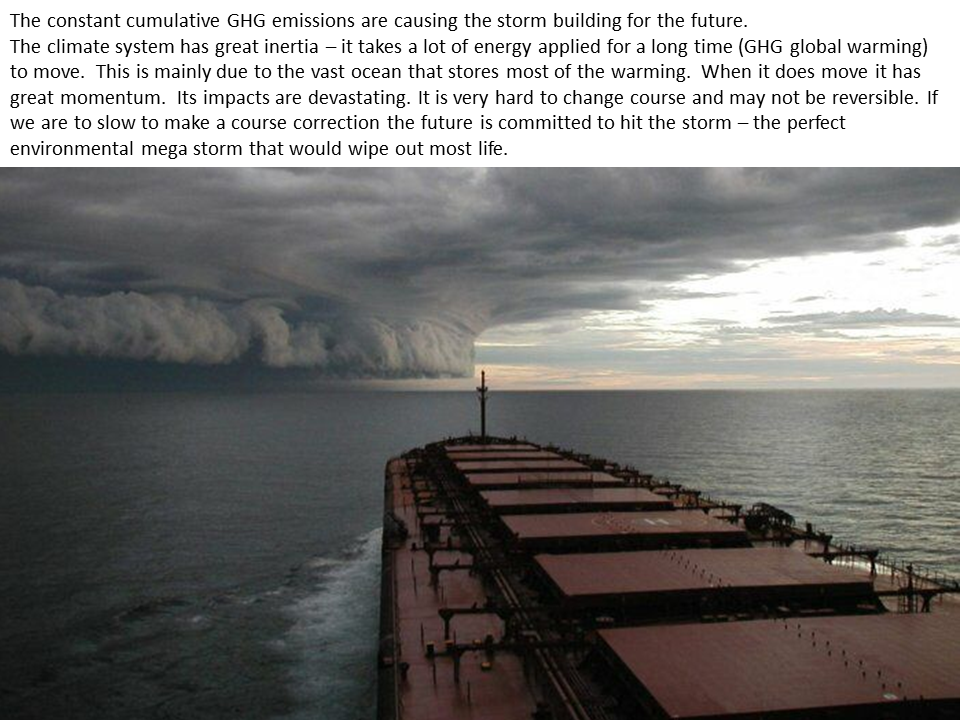
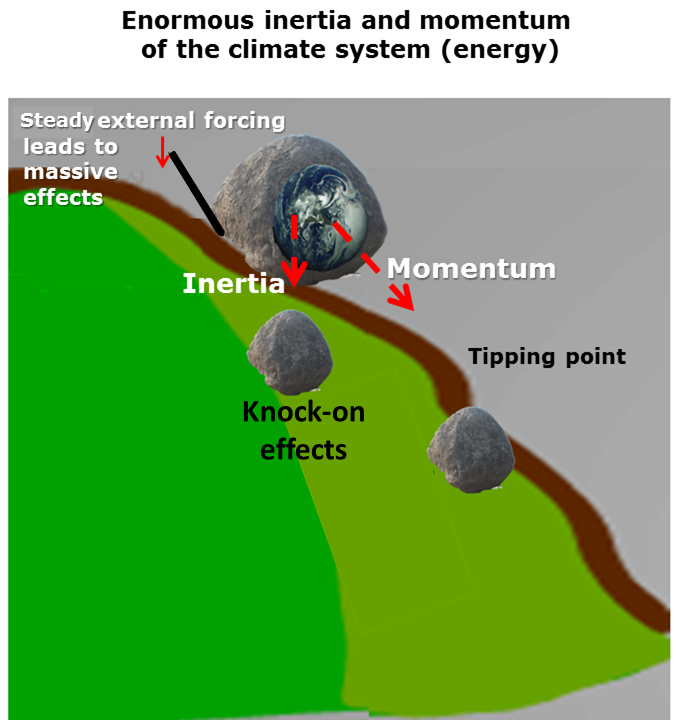
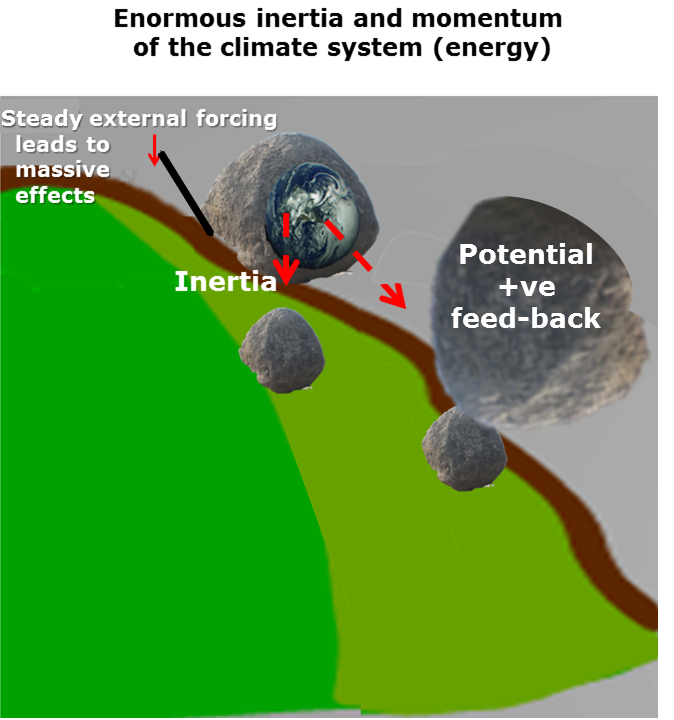

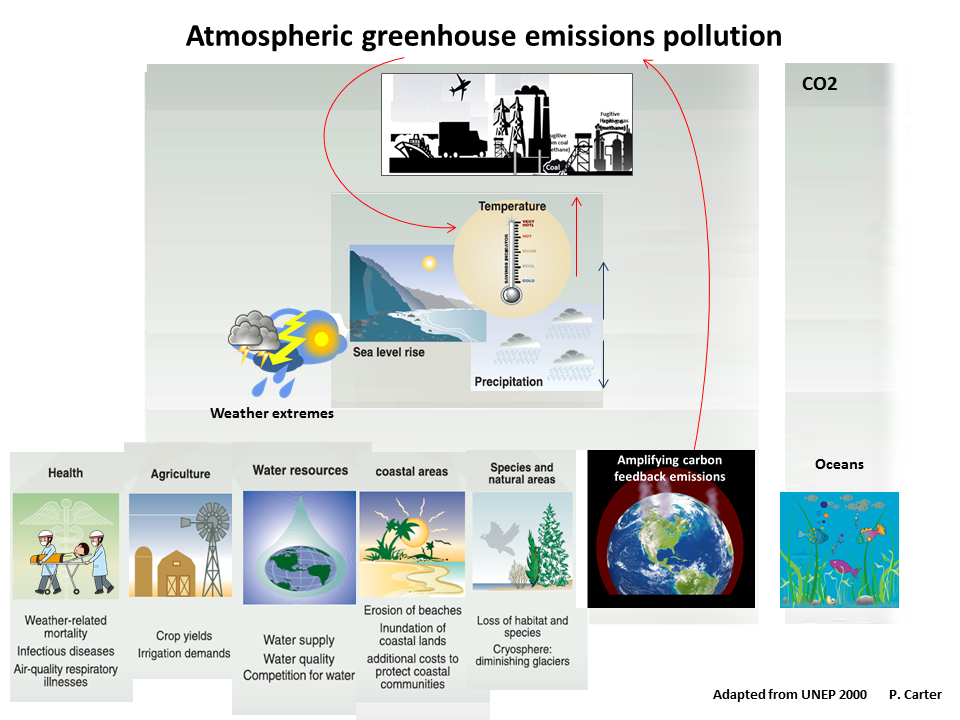
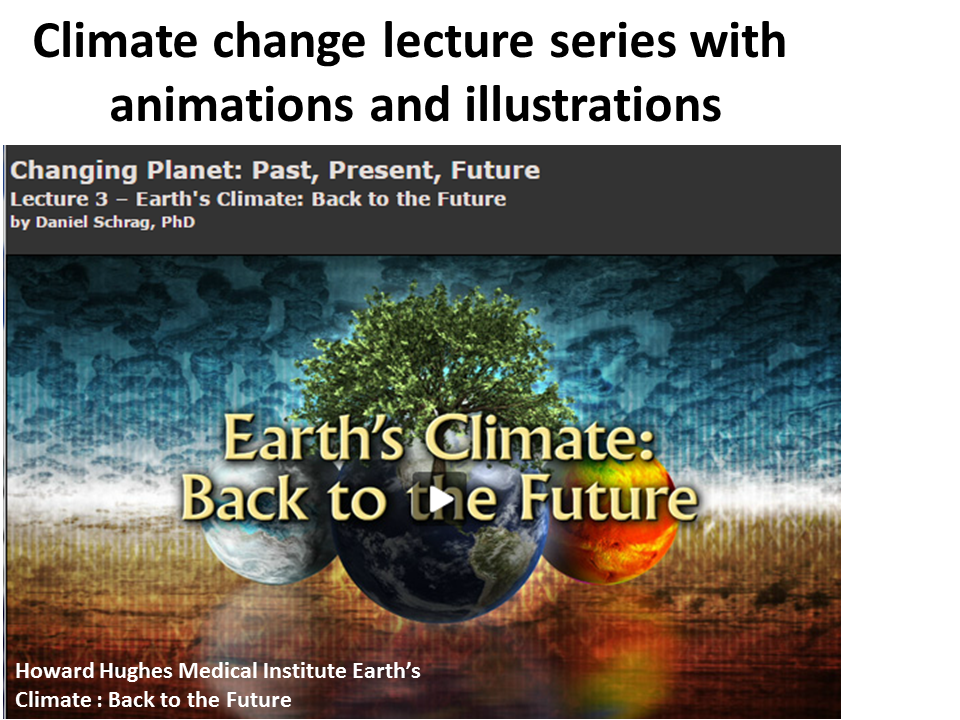
Lecture series HHMI
good animations
good animations
Super tanker
analogy
analogy
UN CC Learn Climate Change e-course training module. Module 1 slideshare Introduction to climate change science
Govt Australia Dept Meteorology Images from “The Greenhouse Effect and Climate Change”
UCAR Meted Climate change ppt presentation 'Fitting the Pieces Together'.
Govt Australia Dept Meteorology Images from “The Greenhouse Effect and Climate Change”
UCAR Meted Climate change ppt presentation 'Fitting the Pieces Together'.
UK Science Museum climate science info zone